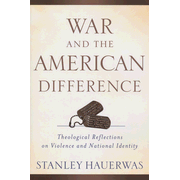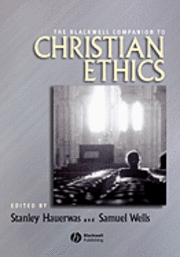My blogposts in English during 2010 was mostly made up of book reviews, and of course most importantly my ongoing project to ”review” every Hauerwas book there is (less than ten to go!). The point of this is actually to make something useful – at least I find it useful – with 30 plus books, one needs a way to find what it is one is looking for, and that it what I am hoping to provide with the guide.
Some of these posts I think have some value of their own. Like my fairly critical review of With the Grain of the Universe, my recommendation (well, yeah) of Hannah’s Child, and my recommendation to stay away from Resident Aliens. I actually have some of my faviourite Hauerwas books left to do, including of course The Peaceable Kingdom, but also Unleashing the Scripture for 2012. (In case you wonder, well of course you don’t, but still, the reason I haven’t written on the Peaceable kingdom yet is that I am translating it to swedish, and want to finish going through in detail before I write about it. I’m on the last chapter at the moment.)
My re-read of Milbank’s Theology and Social Theory is one of the posts I enjoyed writing, and I link to my first encounter with it. Quite a contrast there.
During the summer I read a whole lot of (oldish) political Science Fiction books. Some of them are worth attention, many aren’t. It was supposed to be relaxation, turned into semi-work that actually did not lead to much. Bit of a waste of time. It did get me to realize that I am a Star Trek nerd at heart, though. I might get back to that subject at some point.
I read thorugh the first part of Summa Theologica. I will get back to the rest of it as soon as I have time, maybe this spring. But it did give me a nice way of organizing the introductory course in philosophy of religion this winter – I will give the students one article to read in preparation for each class. I find that Tomas does set the scene for most later developments in philosophy of religion, and this will hopefully give us a good way to start discussion on the central themes, as well as helping the students overcome their fear of ”old” texts.
I think that is about it. I’ll return with an overview of the posts in Swedish soon.

 This, Hauerwas’s other 2011 book, is more tightly focused than
This, Hauerwas’s other 2011 book, is more tightly focused than  Stanley kids Will, saying that Will never had an unpublished thought – and that most of the good one’s are Hauerwas’s. Will’s retort is that nobody would have heard any of Stanley’s thoughts had it not been for Will’s superior syntax. (p. 16)
Stanley kids Will, saying that Will never had an unpublished thought – and that most of the good one’s are Hauerwas’s. Will’s retort is that nobody would have heard any of Stanley’s thoughts had it not been for Will’s superior syntax. (p. 16) This ”Companion” is nothing like most such ”Companions” published in resent years at a mind-boggling rate. It does not provide a balanced overview, with all relevant perspectives given their due. It is all about Hauerwas. Not in the sense that it should be called ”The Blackwell Companion to Stanley Hauerwas” (but I bet that one is on its way sooner or later), but rather ”The Stanley Hauerwas Companion to Christian Ethics”.
This ”Companion” is nothing like most such ”Companions” published in resent years at a mind-boggling rate. It does not provide a balanced overview, with all relevant perspectives given their due. It is all about Hauerwas. Not in the sense that it should be called ”The Blackwell Companion to Stanley Hauerwas” (but I bet that one is on its way sooner or later), but rather ”The Stanley Hauerwas Companion to Christian Ethics”. Please don’t read this book. Or rather, if you haven’t read much by Hauerwas before don’t start with this one. It is written in order to be more ”popular”, that is, it is written more for pastors and lay people than for academics, and it is the book that made him ”famous”, but it is also the only Hauerwas book where all the cliché criticism against Hauerwas, that he is ”sectarian”, ”fideistic”, ”isolationist” and, the one those of us that read Hauerwas in Europe always get, ”too American”, are somewhat true. This book might have made Hauerwas famous, it also made him infamous.
Please don’t read this book. Or rather, if you haven’t read much by Hauerwas before don’t start with this one. It is written in order to be more ”popular”, that is, it is written more for pastors and lay people than for academics, and it is the book that made him ”famous”, but it is also the only Hauerwas book where all the cliché criticism against Hauerwas, that he is ”sectarian”, ”fideistic”, ”isolationist” and, the one those of us that read Hauerwas in Europe always get, ”too American”, are somewhat true. This book might have made Hauerwas famous, it also made him infamous.



